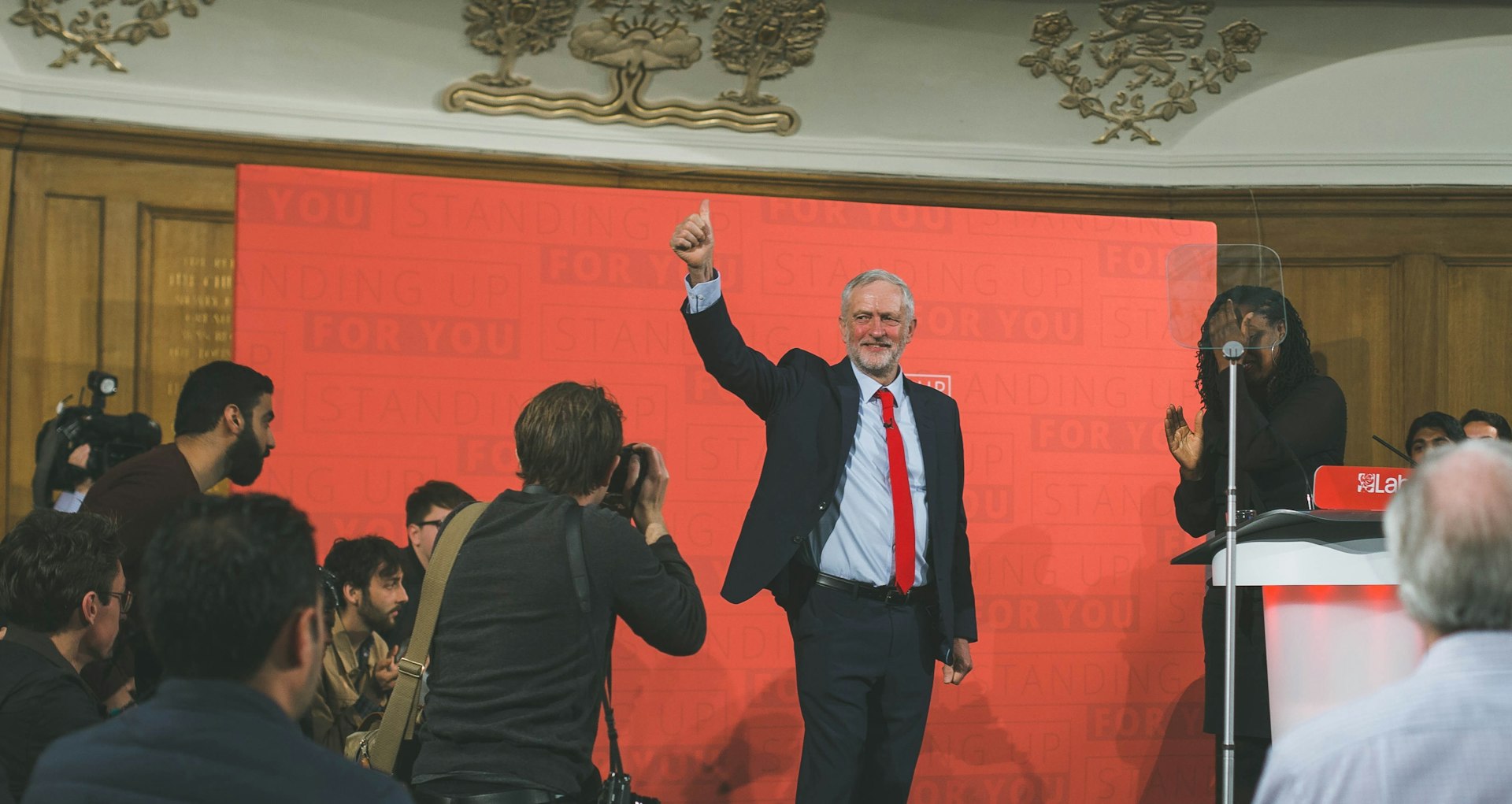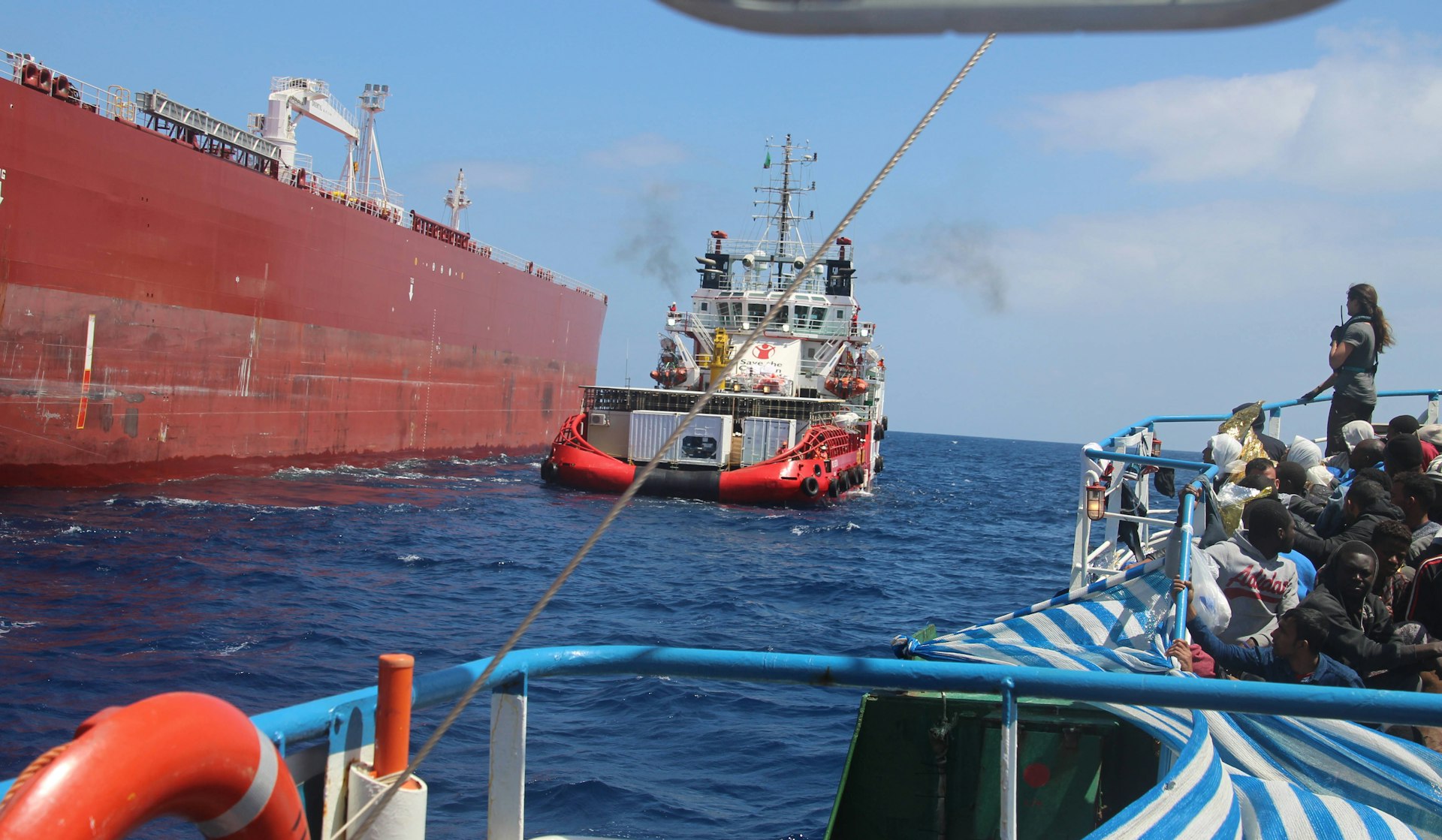
What it’s like to rescue people from drowning in the Mediterranean
- Text by Jessie Seal
It’s a strange thing, waiting. Sitting and wishing your time away feels contrary to any sensible approach to living your life. But last Wednesday evening that’s all I was doing. Sitting and waiting, desperate to conserve my energy, to control my levels of adrenaline, conscious of how soon all my reserves would be needed, how at this point there was far more at stake then a few precious hours of my life.
Our crew of 15 only met each other on Tuesday, but now just two days later we’re arriving into the Search and Rescue zone, some 12 nautical-miles off the Libyan coast. For the first time in the history of our boat, The Iuventa, she has a crew aboard that is a majority women; nine of the fifteen of us to be precise. A postcard pinned up in the galley shows a small girl, clenched fist raised, smiling broadly. A sign beside her reads “a woman’s place is in the revolution”. Underneath a cleverly placed safety sign: “You have been warned.”
I sit watching it, my heart and mind filled with strength. I feel supported by the millions of women putting their bodies on the line across the globe to try and bring change around, to fight injustice. My mother at Greenham Common back in the 1980s; the naked women of the Niger Delta; a close friend of mine locked-on to the runway at London Stansted airport just a couple of weeks ago.
I think about why I’m here. To rescue people, yes, but it’s deeper than that. I want to love, to show my practical love to others, and this seems like the best way right now to do it. I want to witness this horror at the edge of Europe, to provide a lifeline to anyone who we can reach, and to be there for the people who we are too late for and to forever shout “they were there, they were here” in the desperate hope that someone might listen.
For now though, I’m just waiting.
![]()
We, as a crew, are still sussing each other out. We’ve seven European nationalities on board: German, Danish, Scottish, English, Italian, Spanish, Dutch. As a crew we’re young; the Captain is 28-years-old, a good-looking and softly spoken guy, the kind of person you immediately begin to trust. The rest of us are in our twenties and thirties, with just one Dutch guy, a wiry Greenpeace activist, in his late 50s.
I’m sitting in the darkness wondering what our first operation will be like. Earlier today was played out scenarios and ran drills for finding people unconscious, we got to grips with our CPR plan too. Then we discussed where we’ll store the dead bodies; on a small ship like ours there’s little space, no purpose-built morgue. Instead they’ll be placed out of sight, discreetly.
We hope we won’t come across any of the wooden boats making the perilous journey across the ocean without the support of other NGO rescue vessels near us. These can have up to 1,000 people on board and can capsize in a flash, the bilge pump stops working with the engine and as soon as everyone takes a step half a metre to the side, they’ll topple. Most likely we would have to send a crew member on board to calm people and hand out life jackets – they’ll need to have a constant exit and jumping plan. It’s a lot, too much, to think about.
So now I’m lying in my bunk, trying to get some sleep and rest before my night watch starts at 10pm, as it’s impossible to know at what time we’ll be called into action.
The Second Mate and I will be on the bridge until 2am. She is great – Danish – and has been crewing a traditional sailing ship before coming here. Quiet and strong she knows her lines, her knots and her boats. She’s the opposite of me really, I seem to have been taken on board for my crowd control skills. I’ll be working with guests once they’re aboard our boat; communicating, evening them out over the ship, and passing out provisions until a larger vessel comes to collect them.
Being without the internet is strange. Not that many people know I’m here, aside from my parents, my sister, and a few close friends. I felt worried about announcing it, about being seen as a self-promoter for being aboard. I’m worried about failing and having to recount the story. I’m worried about the misery of others becoming an anecdote in my life repertoire.
Now we’re sat chatting and watching, doing our best to fight off creeping exhaustion despite it barely being 11pm, with a shift that’ll last until 2am.
Suddenly from behind we notice a light on a boat from out of our Starboard windows, quickly approaching from the stern. It hadn’t shown up on our radar and took us somewhat by surprise. Moving quickly I go to fetch the captain, and in the time it takes for us to get back up to the Bridge, the boat has crossed our path and is turning back towards us.
We all stand, unsure who or what the boat is, wondering if it’s the military as tensions begin to rise.
“Trawler ship this is the Libyan coastguard… trawler ship this is the Libyan coastguard,” comes a voice through the radio when it’s barely 10-meters away from us. I feel a tinge of panic, everyone talks euphemistically about the ‘incident’ that occurred with MSF last year.
It was this that I’d been constantly stressing out about, probably because it’s easier to worry about that than about anything else that might seen occur.
Turns out they were concerned we were fishing, our Arabic speaking crew member explaining clearly this wasn’t the case. The boat sails away from us, and we return to our watch.
The engine has been switched of by this point and we’re sat drifting, rolling in every direction. Once the distraction of the coast guard has calmed down, I start to feel seasick for the first time on this journey. I’m happy when the next crew arrive to relieve us from the watch. As soon as I make it downstairs, retching starts and the first vomit of the expedition makes itself known to me.
By Saturday morning we’re moored in Zarzis – a port city in Tunisia, hiding from a storm and waiting patiently for it to pass. The sail from Malta had been peppered with small events. We’d been called by the Maritime Rescue Coordination Centre as soon as we’d left Malta, and headed full speed towards the SAR zone. Reports had come in that a lot of boats had launched that night, but by the time we’d arrived other rescue vessels had taken care of several smaller rubber boats and a wooden one.
We’d waited it out overnight, just in case, in case anyone was desperate enough to try and launch before the storm hit. We weren’t needed, and in the morning our captain had made the call to head to Tunisia, a 10-hour journey for us to stay safe during the otherwise turbulent hours at sea.
Here though we’ve become something of a local attraction – a boat crewed by 9 women (and 5 men) is a sight to behold. A plan has been concocted to leave the boat for a few hours; I’m told we’ll be visiting a cemetery. A few hours earlier a local man from the fishing association had come to speak to us, he’d talked of a place where he’d been burying bodies washed up in the water.
We head out in a couple of taxis, heading for a while down a main road then onto a bumpy track. It’s cold, grey and wet; far from your stereotypical depiction of this part of North Africa.
The car we are following stops by a rubbish drop off point. Piles of plastic everywhere, garbage strewn around. As we get out the man explains that this is where some eighty bodies are buried. He points to the mounds next to the rubbish and tells us about the body he buried alone on New Year’s Eve while everyone else was celebrating.
He, like me, is a volunteer. He speaks of how he found a woman and her baby bound together; a baby on its own bound to a piece of wood. He assumes that the parents placed it there before drowning.
He asks where is our humanity? That we do not give people the respect they deserve even in death. That people must be buried in unmarked holes in a rubbish tip.
By the time we get back to the boat the weather is calming, and we get ready to leave Zarzis.
I can’t tell what day it is anymore and my body clock is fucked. I should be sleeping, I think, but it’s 1am and I’ve just woken and sat up sharply in my bunk. I think we’re heading back to Malta now, but everything is blurry. My laptop says it’s Tuesday.
I lie back down, starting to process what’s gone on. I don’t know how many bodies we left in the water. The Italian coastguard are stating that 8340 people were rescued in the SAR zone on 14 and 15 April. It was down to three small volunteer crewed rescue boats to deal with. The EU warships in the area sat silent.
Every boat has blurred into one, each day only has flashes of memory. On Friday we rescued close to 300 people, the conditions were calm, people happy.
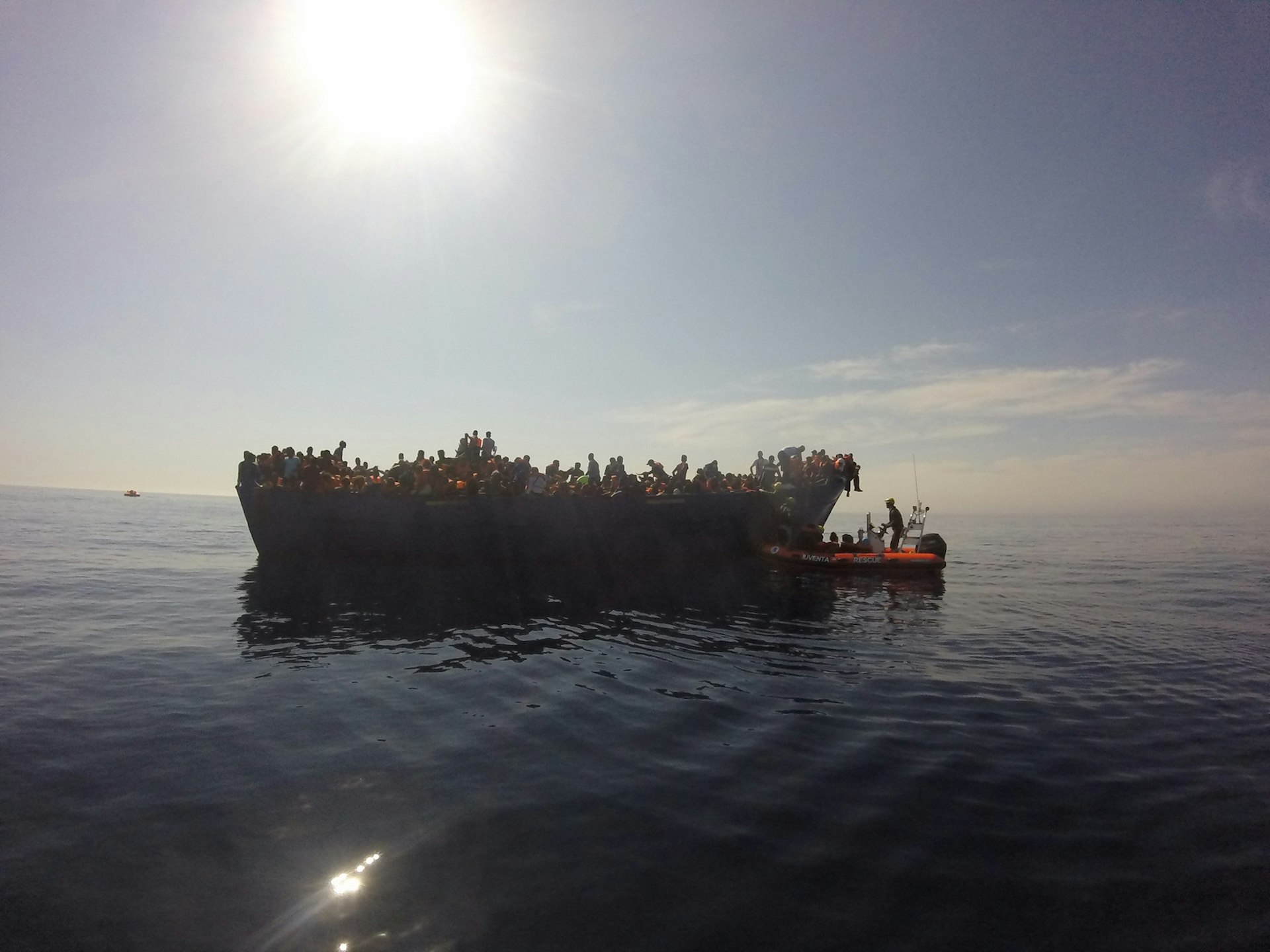
At some point on Saturday daytime we were once again surrounded. I can see people splashing in the water, jumping out of their boats as I stand on our small rescue ship – 33 metres long.
Slowly people are shuttled on. Every type of person among them. A white woman in a headscarf and her two blond twins, she’s dressed in a long leather coat and patent shiny shoes. Her two daughters are both under 8, petrified. They look like my cousins. The woman is Syrian, she speaks perfect English. Every time one of the crew goes past her, she asks where her husband is. He is still on the wooden boat. I look out towards it and promise her we are doing all we can to bring people to safety. I know already that her husband might not make it. She is called May, it’s my middle name.
In the background I hear women singing, the most beautiful harmonies ever to hit my ears.
“Welcome. Safe, safe, safe, you are safe now, safe, safe, safe, you are safe now. Sit down, please sit down. Sit there.”
I repeat these words over and over again, it becomes my mantra. No one knows how many were on the wooden boat: 500, 600, 1000? We’re the only rescue boat in the area. Everyone else is already busy. In every direction I can see new rubber boats on the horizon, each with 150 people on them or more.
More and more people are jumping into the water. They stream up from the underbelly of the wooden boat. Some have life vests on, some simply cling to them while they attempt to swim.
The engineer and I stand by the starboard side, looking out at the people in the water. Five or six men make it on board. I can see their faces long before I can help them. We shout at them to keep on swimming, willing that they don’t slip under before our eyes. The sun is shining, the water flat, and one by one this group make it; soaking, freezing, terrified.
![]()
Sometime later, I have no idea how long, a man on the deck asks if he can see his wife and children. My heart drops as I tell him he can look, but I don’t know if they are here. He starts looking, May and her two daughters are there. They run to each other and he grasps his daughters tightly. Several hours later, they realise that their grandfather is on board too. I hate the word lucky but they all are.
Darkness comes and still we have more vessels.
I’m still focussed, helping more people aboard. I hear a gut-wrenching cry of “NO” from somewhere behind me; I turn to see what looks like a ghost ship coming out of the darkness towards us at full speed. A huge wooden boat just meters away from us, and as it passes people begin to jump.
“Stay in the life raft, in the life raft you are safe. You are safe, safe, safe. You are safe.”
People in the life rafts are already terrified, the roof is collapsing as panic sets in. They try to jump out onto our deck, but we’re forced to push them back.
“You are safe in the life raft. I can see you. I can see you. You are safe.”
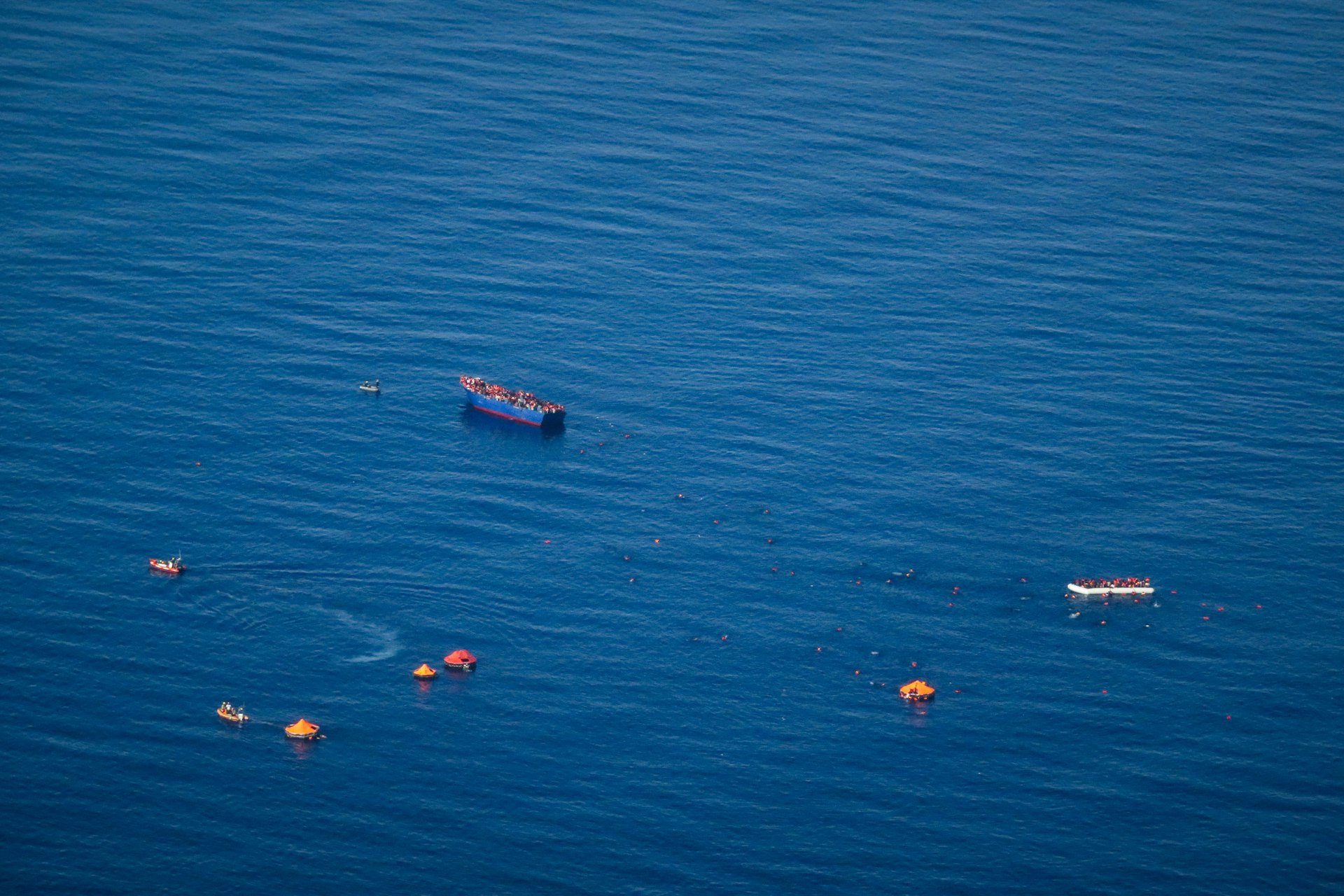
The night goes on, the crew continues working. Time passes slowly; the First Mate reports that the Italian coastguard is coming soon to collect our guests. A sigh of relief. We wait.
The Italian coastguard has come across new vessels in distress, we’re no longer their priority, they’re not coming to help.
The weather is getting harsher, the waves rougher than expected, we cannot turn for fear of people falling from the deck. The only plan is that we head to Lampedusa – an Italian island – with 309 people on deck.
By 13:00 the captain decides to launch a Mayday call, I try my best to ignore this alarming reality and keep on working. We set about cooking couscous – heavy with salt and stock to try and replenish nutrients, but it’s not enough for people who’ve not eaten for days on end. We wait to see if any boats will help us while we set course for Lampedusa, aware that the European warships in the area are listening to us, and ignoring us. We can no longer guarantee the safety of everyone onboard.
Another night comes and people get colder and more tired, lying on the metal deck desperate as they wait. The pregnant women get weaker, three collapse as we take them down to the makeshift hospital onboard.
I go around the ship scavenging anything that might be used as a makeshift blanket; I spend the night watching over people as the waves splash over those asleep on the deck.
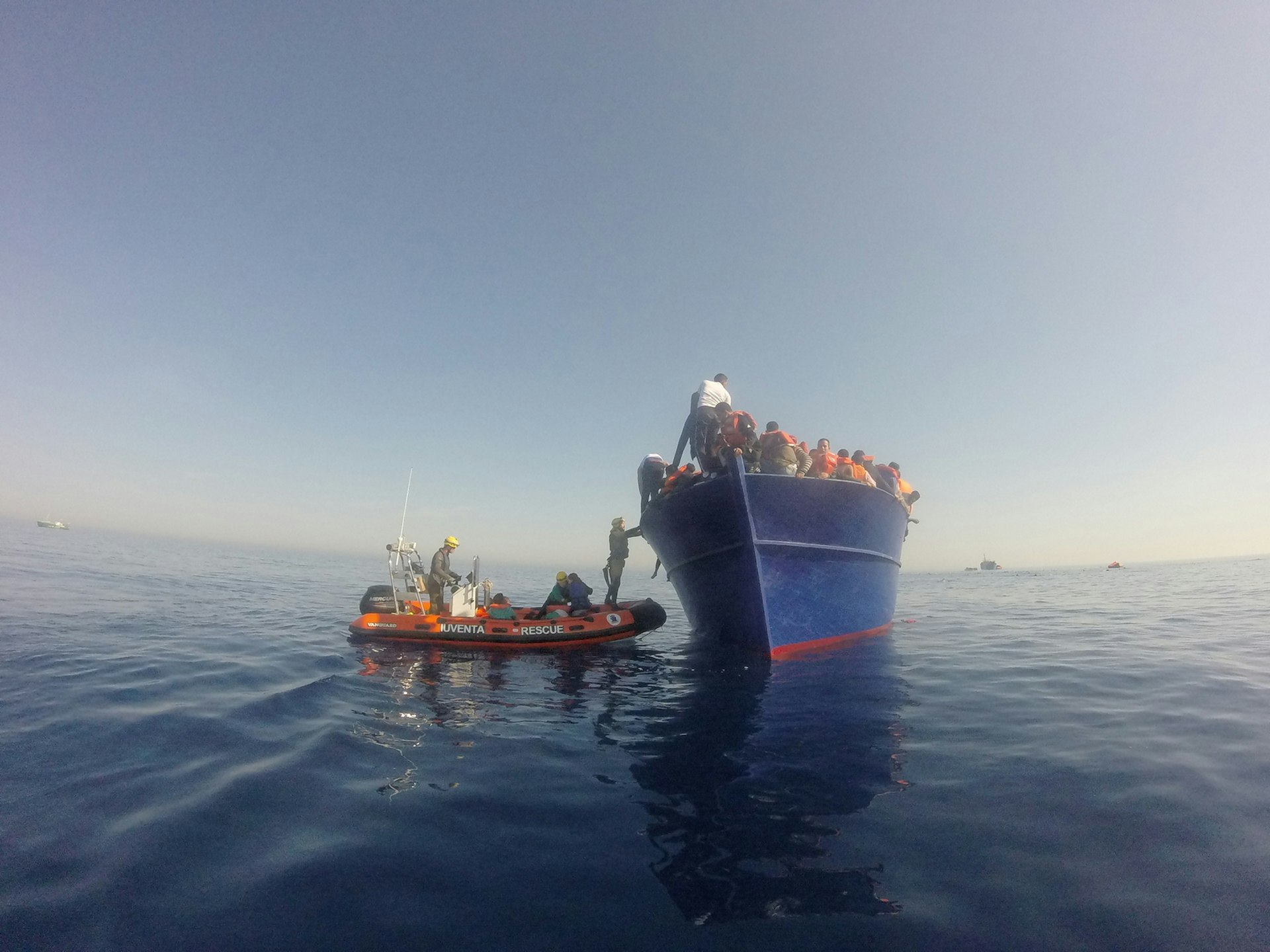
In front of me lies Rebecca, a 19-year-old girl with severe stomach pains, and she is terrified. The medics give her an injection which knocks her out for an hour or two, but at 3am she quietly whimpers. I sit with my hands on her back. She moans that her ears hurt, she’s so agitated and pained, I can’t tell if this is real or if she’s hearing things in her head.
Morning breaks and we hear that the Vos Hestia – a ship belonging to NGO Save The Children – is on its way. A tanker has also finally answered our May Day, and will move alongside us, providing protection from the waves until we can transfer people safely away. As soon as we can see the Vos Hestia, I tell the guests the good news. The women, who yesterday were singing so beautifully, can now barely muster the energy to sit up.
Finally, the Vos Hestia pulls up alongside us, our amazing captain and first mate pulling off a difficult manoeuvre despite not having slept for days. Slowly in open water, we start disembarking people. As they move down the ship, we shake hands and offer each other good luck. We smile. People who still have some strength left (although god knows how), support those who don’t. A sense of humanity, so much more than Europe’s own.
Soon, the people who I’ve shared this journey with will all be gone, and as they leave I apologise that we couldn’t do more. One woman shrugs, she shakes her head as she smiles at me.
So now I lie here in my bunk, once again waiting, passing the time until I’ll finally be home. Days ago I’d waited patiently to try and preserve my energy and resources, now I’m just waiting to find out if I’ll ever again find strength.
I’m asking myself how, despite our best efforts, there’s so much more to be done. How back at home in fortress Europe we sit silently as these horrors occur day and night. How the European warships sit silently as so many in the water meet their death.
We’d had 1,000 people on board, directly involved in the rescue of some 3,500.
I shut my eyes. I see the woman smiling and shaking her head.
Donate to Jugend Rette and find out more about their work.
Enjoyed this article? Like Huck on Facebook or follow us on Twitter.
